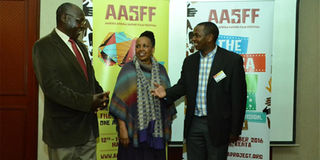Lights, camera, action as Nairobi hosts film festival

From left: Director of Film in the Ministry of Sports, Culture and Arts Ernest Kerich , Fepaci executive director Jane Murago-Munene and Fepaci advisor Hon Ndiritu Muriithi talk to during the media workshop. PHOTO| COURTESY
What you need to know:
- Film-makers in Africa face a myriad challenges, not least of which is the capital-intensive nature of the business.
- Lack of distribution channels is a major setback that has pushed most nascent film-makers online.
Nairobi will host the inaugural regional Ambika Afrika Safari Film Festival on October 12 to 19.
Organised by the Pan African Federation of Filmmakers (Fepaci) and a local organisation, Communication Pathways Trust, the festival brings together African film-makers in the tradition of other Fepaci festivals, such as Fespaco in Ouagadougou, Sithengi in South Africa, Ziff in Zanzibar and Ziff in Zimbabwe.
Fespaco, founded in 1969, is currently the largest film festival in Africa for African films.
“Fepaci’s main objective is to decolonise our screens. It is about Africa by Africans for Africans. We know there’s a lot of money coming from the West for film-making in Africa. But this money often comes with prescriptions.
"We are saying 50 years of independence is enough, and Africa needs to make its own films,” said Murago-Munene, a veteran documentarist and the executive director of Fepaci’s regional secretariat. She was speaking at the launch of the film festival in Nairobi in early September.
Munene said Fepaci empowers film-makers through training, creating the necessary infrastructure and lobbying for favourable policies.
Fepaci was also behind the creation of the African Audiovisual and Cinema Commission, a specialised agency of the African Union created in June this year.
The commission is tasked with growing investment in the African film industry, from the current $5 billion to $20 billion annually, and growing the number of jobs from the current five million to 20 million.
CHALLENGES FOR FILM-MAKERS
Film-makers in Africa face a myriad challenges, not least of which is the capital-intensive nature of the business. Lack of distribution channels is also a major setback that has pushed most nascent film-makers online.
The festival will also address content and distribution issues, according to Ernest Kerich, the director of film at the Department of Film Services.
“This festival gives film-makers the opportunity to take the lid off our own stories and combat the cultural estrangement. Our forefathers achieved physical liberation. Our generation shall achieve mental and spiritual liberation.
"This requires structures, skills and national policies. We are working with the African Audiovisual and Cinema Commission to see the development of a robust film industry that projects a positive image of Africa.
"We want to change the situation where African films win awards and achieve acclaim in other world festivals but are not available to Africans,” he said.
The Ambika film festival will comprise four major events. From October 12 to 16, there will be film screenings of African productions that advance the African story, sourced from Fespaco, Kenyatta University and the Kenya Institute of Mass Communication.
The screenings will be at the Louis Leakey auditorium at the National Museums of Kenya. The highlight will be the screening of Timbuktu, Abderrhamane Sissako’s award-winning film that won at the 2014 Cannes Film Festival and was the best film at the Africa Movie Academy Awards in South Africa in 2016.
The Africa Film Forum takes place on October 18 at Radisson Blu and will be a policy discussion on data collection and cinematic expressions of the continent.
Investors, financial institutions, film-makers and entrepreneurs will be talking numbers at the African Film Finance Summit, a platform aimed at launching film funding partnerships.
Finally, there will be a pitching forum where film-makers sell their idea to a jury. For those selected, they will receive training and financial support to shoot their films.




